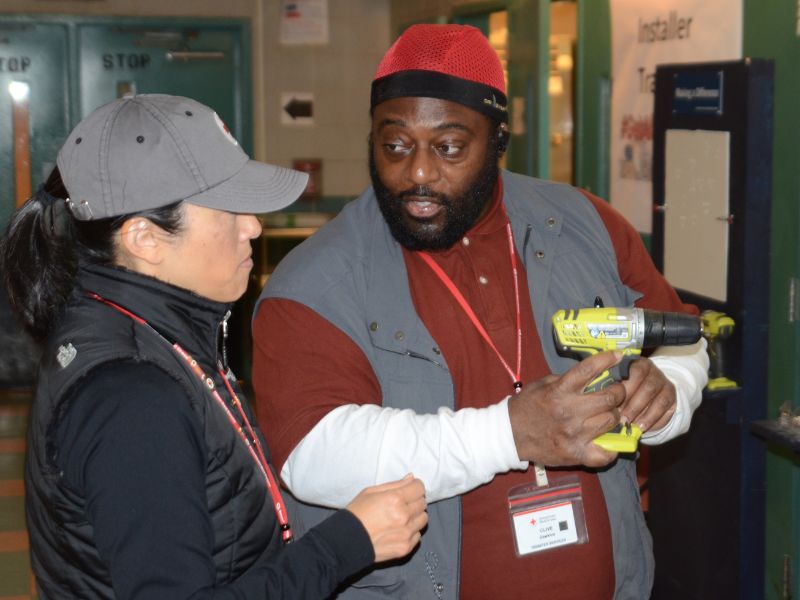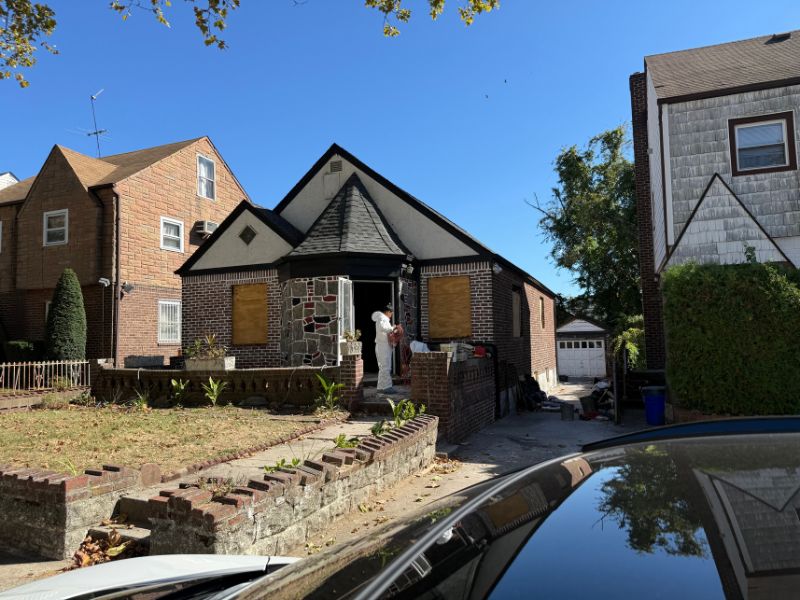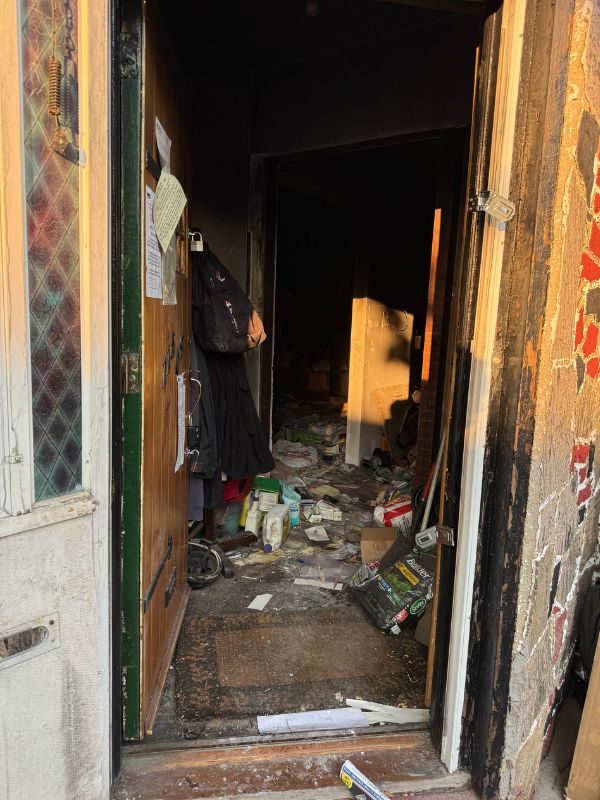
Red Cross volunteer Clive Dawkins shows how to use a power drill to install smoke alarms during a 2015 Home Fire Campaign event held in Jackson Heights, Queens.
By: Frederic Klein
Clive Dawkins was in the hospital when his phone rang on August 24, 2024.
It was the Fire Department of the City of New York.
“I’m at the hospital that Friday, they’re running a number of tests,” said Clive. “I get this call from FDNY, and the guy says, ‘are you Mr. Dawkins? Your house is on fire.’ I said, ‘this must be a prank call.’”
Sadly, it was not a prank call.
When Clive called his neighbor to check on the house, they confirmed his worst fears — there were flames coming out of his basement window. His neighbors on either side of the house hadn’t realized how large the fire was until they noticed at least four different FDNY companies on the block, working hard to extinguish the flames.
As his home in the Cambria Heights neighborhood of eastern Queens went up in flames, fire engulfed every treasured memory he owned — family heirlooms from England and Jamaica, relics from his school days like art projects and poetry he had written, drawings he made as a teenager, and mementos collected from travel all over the world.
Also rapidly turning to ash were things he needed to live — clothes, footwear, copies of his college and graduate school diplomas, medical equipment to manage his recent diagnosis of diabetes, eyeglasses, and more. The home that had been in his family since 1974, that he had worked so hard over the past three decades to renovate and make his own, was gone.

The Cambria Heights home of Clive Dawkins, shown boarded up after a fire in August 2024.
An electrical engineer by trade, Clive has dedicated much of his limited free time to helping support community preparedness. He has helped teach preparedness with both the Red Cross and NYC Emergency Management and has installed free smoke alarms with the Red Cross Home Fire Campaign. He had three go-bags in his home along with five new smoke and carbon monoxide alarms to replace the ones that were approaching the end of their ten-year life span.
Once Clive got out of the hospital, he knew it was his turn to ask for help. His bank account was empty, his last dollars spent to pay off his mortgage and for his diabetes medications. He called the Red Cross and connected with Jefferson Lee, a Response Manager for the Red Cross in Greater New York. They arranged for Clive to come into the office.
“I drove into [the Red Cross headquarters] on the same day I was discharged from the hospital. I was really worn. I was tired of everything. The only thing I had were the clothes on my back and the slippers on my feet,” said Clive. “I had just picked up all the stuff I needed for my diabetes, all up in flames. All my preparatory stuff gone. All the medications that I’ve been taking for the last few months gone. I just lost everything.”
Jefferson met with Clive and checked in on him as he set up the standard emergency financial assistance that the Red Cross offers to people who have had their homes severely damaged or destroyed by disasters. He made a referral to Red Cross Disaster Health Services, where Clive met with a volunteer nurse who helped him think through what medical items had been destroyed in the fire. She set up supplemental financial assistance to help cover the cost of replacing his medications, medical equipment, and eyeglasses.

The inside of Clive Dawkins' home in Cambria Heights, Queens after a fire left major damage in August 2024.
“Disasters affect people physically, mentally, and spiritually,” said Jefferson. “One of things we can do to help create trust and connection is to find a commonality with the person we are helping. For Clive, he had done so much to help others throughout his life and here he was, just out of the hospital, having lost everything in a fire. The most important thing we can give people is hope.”
As Jefferson finished registering Clive for assistance, Jefferson shared his own story of a recent car accident that impacted him and his wife. The men bonded over a shared faith and trust in a higher power to give them the peace and strength they needed to get through each day amidst complicated feelings of loss and confusion.
Once they finished, Jefferson took one more step in his personal capacity and asked Clive if he would like to pray with him. Moved by the gesture, and thinking he could use all the help he could get — deity or not — Clive readily agreed, and the two men prayed together.
“No one and no pets were in the house, it was a higher power that insured I was in the hospital being treated for a rare but intense migraine,” said Clive. “Reviewing the events of the night with my neighbors, it is clear that it would have been doubtful for anyone to escape the intensity of this rapidly, all-consuming blaze.”
As we head into the holiday season, Clive is still on his road to recovery, with contractors starting to get to work on rehabilitating his home while he stays in an insurance-paid apartment across the Queens-Nassau county line in Mineola, New York.
“I was caught in the middle of a diagnosis where I just got the tools to treat it,” said Clive. “Thank goodness the medical team was able to help me with the monitoring stuff so that I didn’t skip a beat. Thank goodness that the support the Red Cross provided was enough to get me through that night.”
So far in 2024, the Red Cross in Greater New York has responded to more than 1,500 home fires and other disasters, helping more than 3,700 families across New York City, Long Island, Rockland and Westchester counties and Greenwich, Connecticut. Learn more about our work in 2024 here.
Support all the urgent humanitarian needs of the American Red Cross.
Find a drive and schedule a blood donation appointment today.
Your time and talent can make a real difference in people’s lives. Discover the role that's right for you and join us today!